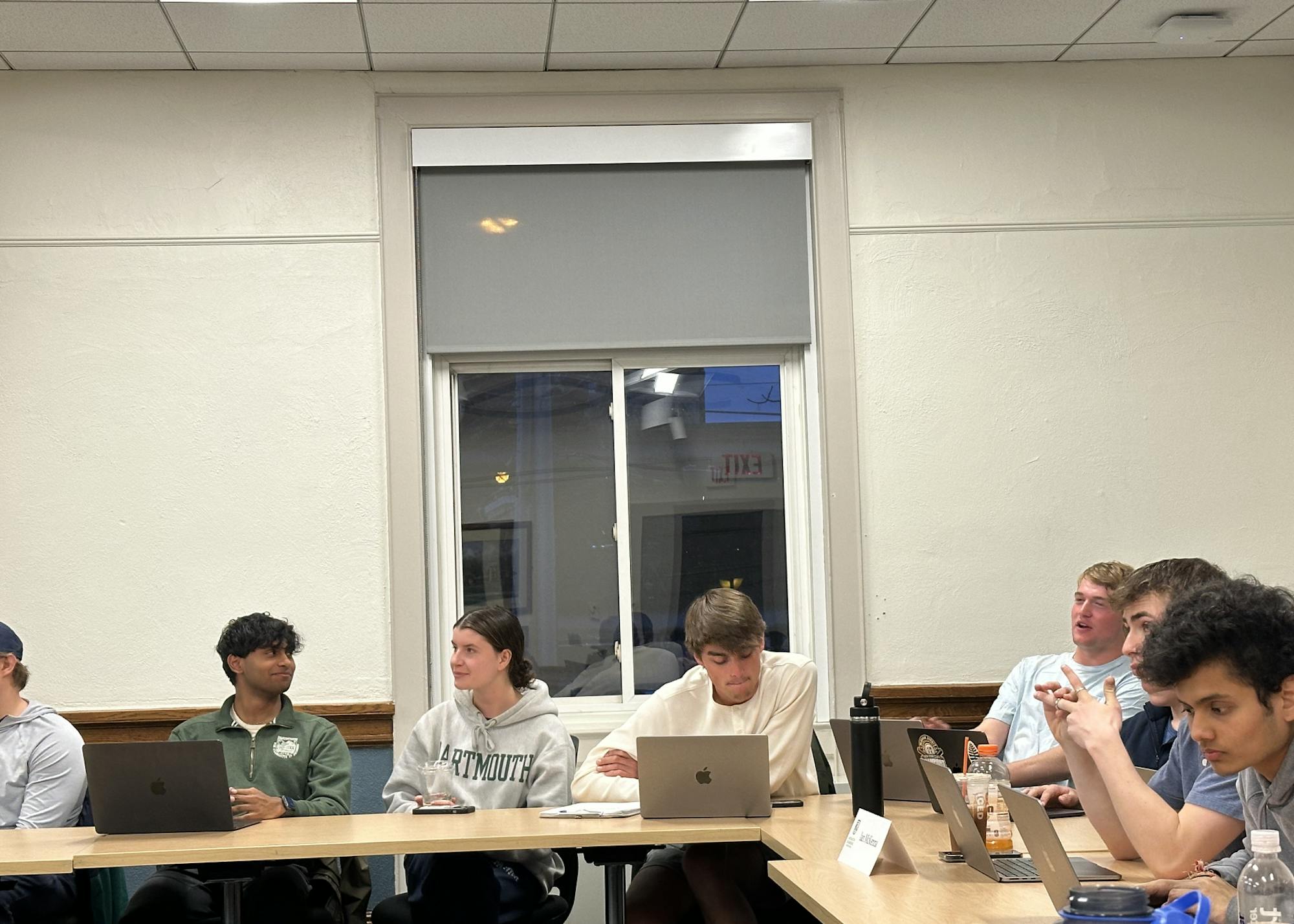On April 14, the Dartmouth Student Government Senate met for its third weekly meeting of the spring term. Led by student body president Jessica Chiriboga ’24, the Senate discussed projects to improve student access to non-alcoholic beverages and the adoption of biodegradable cups in Greek houses and at the Collis Center during Green Key .
School House senator JJ Dega ’26 requested $1,000 to expand the Polar Project — which provides seltzer water to Greek houses as a non-alcoholic alternative — for Green Key weekend in May. On Jan. 28, the Senate voted unanimously to provide $1,000 to help the Student Wellness Center fund the Polar Project for Winter Carnival in Greek houses, according to past reporting by The Dartmouth.
The Polar Project, named after the brand Polar Seltzer, is part of College President Sian Leah Beilock’s goal to create institutional support for well-being, according to the SWC’s website. Greek spaces are “encouraged to pick up” or receive delivery of eight cases of Polar seltzers per event from Stinson’s Village Store. While the Office of the President and the Dean of the College provide general funding — $7,000 in the fall of 2023 — the SWC collaborates with the DSG Mental Health Committee for big weekends such as Green Key, according to the Polar Seltzer Project Report for the fall term.
“[The funding provided in the winter] definitely helped raise awareness for the program,” Dega said. “Through the $1,000, we expanded the program to include Spindrift [sparkling water] and set the project on a great track.”
Dega said there is a “concern” that the Polar Project’s current budget is not sufficient to accommodate the 15 to 20% increase in the number of students on campus from the winter to spring terms. Dega noted that the program has previously faced “budgetary concerns.”
“The spring sees more events in Greek spaces … and on Green Key weekend, there’s not only events on the main stage, but also in the Greek spaces,” Dega said.
If either the Office of the President, Office of the Dean or Office of the Provost provide funding for the project before DSG does, the latter will not provide the $1,000, Dega said. Additionally, Dega said DSG’s “hope” is that current funding sources increase their contributions by next year so that DSG will no longer need to contribute to funding.
The Senate voted 15 - 0 - 1 to provide conditional funding to the Polar Project.
Dega also requested $500 for a bulk order of biodegradable cups made of corn for “hydration stations” in Greek houses and around the main stage during Green Key weekend. The cups are the same dimensions and cost approximately the same amount as those currently used in Greek spaces — seven to eight cents each, according to Dega. They were created by three Dartmouth students involved in Greek life who wanted to “solve the problem of unsustainable cups on campus, especially in Greek spaces,” Dega said.
However, the students who created the cups were unable to obtain the $500 they needed in funding — which they planned to use to manufacture approximately 8,600 cups — from sources such as the Sustainability Office or the Greek Leadership Council. Dega said the Sustainability Office does not provide grants to student projects, and the Greek Leadership Council cannot fund event supplies.
According to Dega, leaders of campus fraternities — including Bones Gate, Chi Gamma Epsilon, Gamma Delta Chi, Kappa Pi Kappa and Psi Upsilon — have expressed support for the use of biodegradable cups but have been hesitant to “make that first commitment.” The purpose of DSG funding, Dega said, is to “front the cost” so Greek houses can see the “effectiveness” of the new cups.
An initial vote to approve funding for the cups passed 11 - 0 - 5. The Senate decided to wait to provide a distribution plan until the next DSG meeting. However, the vote was vetoed by Chiriboga, who encouraged the Senate to vote on conditional funding to ensure the cups will “actually [be] used for hydration stations” to meet requirements for funding provided by DSG.
Chiriboga and Dega proposed three conditions for the project funding: the students must distribute the cups at the Collis Center main stage and to Greek houses for use at hydration stations, create a document of frequently asked questions about the corn cup program to encourage their use at hydration stations and distribute a QR code survey to collect feedback from students and Greek houses about the new cups.
A new vote to provide $500 in funding with the conditions stipulated passed 13 - 2 - 1.
At the end of the meeting, North Park House senator Sydney O’Connor ’27 discussed her meeting with Collis Center director Joseph Castelot, which focused on the Dartmouth Hammock Pilot Project. The project will provide eight reservable hammocks through the Collis Center by week five or six, according to O’Connor.
DSG Senate meetings occur weekly on Sundays at 7 p.m. in Collis 101 and are open to all students.
Annabelle Zhang '27 is a reporter and editor from New Jersey. In the classroom, she studies Geography and Government modified with Philosophy and Economics. She enjoys creating recipes, solving puzzles and listening to music.




